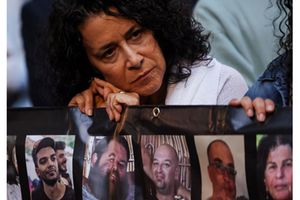
President William Ruto.
Muslim clerics on Thursday slammed President William Ruto for failing to join the international community in calling for peace as deaths and mass killings continue in Gaza and Lebanon.
Supreme Council of Kenyan Muslims (SUPKEM) Chairman Hassan Ole Naado led various Muslim stakeholders and organisations in condemning what he described as atrocities perpetrated by Israel against Palestinians and citizens of Lebanon.
They lamented that while other countries continue to take a stand on the issue, the Kenyan government remains silent and seems unconcerned about what is happening in the Middle East, not even participating in peace efforts.
“Kenya is known as a hub of peace in Africa but, surprisingly, the government is not saying anything about the increased butchering of citizens in Gaza and Lebanon. President Ruto should condemn what Israel is doing and help in the process of finding peace just the way the government is doing in Haiti,” said Mr Naado.
Israel is fighting the Hezbollah terrorist group in Lebanon, while also fighting for control of the Gaza strip in a long-running war with Palestinians.
“It is our call on the government of Kenya to stand for fairness and justice for the people of Palestine and use its influential role to push for an end to the killing of the people of Palestine who deserve to live in peace and harmony like other people around the world is attained,” he added.
The official was accompanied by Muslim clerics and stakeholders from the National Muslim Leaders Forum (NAMLEF), the Council of Imams and Preachers of Kenya (CIPK), the Kenya Association of Muslim Medical Practitioners (KAMMP) and several mosques around Nairobi.
The Muslim organisations also launched a fundraising campaign to help Palestinians affected by the war in Gaza, setting a target of Sh64.5 million.
In Gaza, Israel's relentless bombing campaign has killed more than 42,000 people and displaced more than two million.
Kenya condemned what it called terrorism by the militant group Hamas when it launched attacks on Israel on October 7 last year, killing 1,200 people and abducting about 250 others.
But Nairobi also called for a ceasefire after Israel continued to bombard hapless civilians.
Since then, Kenya has appeared to lean towards Israel, although it officially calls for a two-state solution to end the perennial Israeli-Palestinian conflict.
However, when a vote was tabled at the UN General Assembly last month calling on Israel to end its occupation of Palestinian territories within a year, Kenya was among the countries that boycotted the vote.
Yet just five months earlier, Nairobi was among the countries that pushed for Palestine to be given a seat in the Assembly and the ability to propose resolutions. That vote, which was overwhelmingly supported by the Assembly, was the first to be tabled by Palestine. But it wasn't legally binding.
Nairobi argued that the solution to the Palestine question was political, not legal. The resolution was tabled in accordance with a decision by the International Court of Justice, which ruled that Israel was an occupying power.
Israel has been accused by the international community of restricting the entry of food and other desperately needed humanitarian supplies to most of the people of Gaza, putting them at risk of starvation.
Mr Naado said it was only good for Kenya to join the global efforts to call for peace and stability in Lebanon and Gaza instead of doing nothing when it is a global peace crusader.
“Kenya is known for its role in fostering peace and this was seen notably in South Sudan and other African countries where our country tirelessly worked to achieve peace and stability. The same vigour should be seen towards pressuring for peace in Lebanon and Gaza where people are dying in large numbers,” said Mr Naado.
Kenya has been silent on the Lebanon issue, except to respond to distress calls from Kenyans stuck there. It has asked them to register for evacuation.









